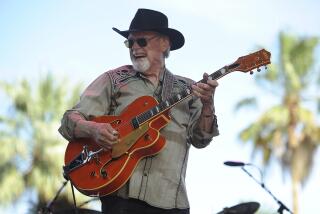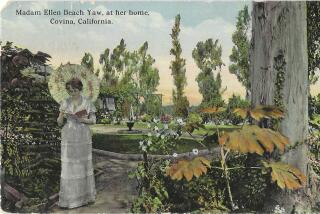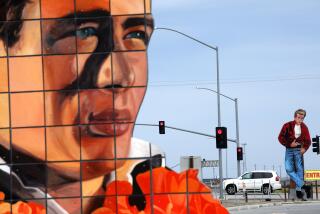Eddie Dean, 91; First of Singing Cowboys to Star in Color Movies
- Share via
Eddie Dean, one of the last singing cowboy stars of the 1940s, died Thursday of heart and lung disease in Thousand Oaks. He was 91.
Known as the golden-throated cowboy for an exceptionally melodious voice, Dean appeared in more than 30 Western movies starting in 1936. In the 1940s he was among the 10 most popular cowboy stars and was the first singing cowboy to do movies in color.
“That is really what sold my pictures--the color,” he told author David Rothel in the 1978 book “The Singing Cowboys.” “Because they had singing cowboys out there [in Hollywood] like crazy. You could go around every corner and run into a singing cowboy.”
Judging from the critics comments, it certainly was not Dean’s acting that made his films memorable. They described his performances with terms such as “so-so,” “self-conscious” and “indifferent.”
Most critics agreed that Dean’s singing was the best part of his movies. He possessed, in the words of one critic, “one of the better sets of pipes among cowboy Carusos.” The late Gene Autry, with whom Dean appeared in several movies, once said he had the best voice of all the cowboy singers.
“He was a singer first and foremost,” said James Nottage, curator at the Autry Museum of Western Heritage, which honored Dean, Gene Autry, Dale Evans, Monte Hale and other singing cowboys at a three-day festival in 1992.
Dean performed well into his 80s, often appearing at the Palomino Club in North Hollywood. In addition to singing country and Western tunes, he was a skillful impressionist. His depiction of Elvis Presley, Nottage said, was masterful.
Dean also composed about 100 songs, including the country and Western classic “One Has My Name, the Other Has My Heart” and “I Dreamed of a Hillbilly Heaven.” Many of the songs were co-written with his wife of 68 years, Dearest, who survives him.
Born Eddie Dean Glosup in Posey, Texas, Dean started in show business as a vaudeville singer. In 1930 he landed his first radio show in Tulsa, Okla., and soon moved on to the “National Barn Dance” program. Later, he won a singing role on the popular “Judy Canova Show.”
He segued into films around 1936 with bit parts in Westerns such as Tex Ritter’s “Golden Trail.”
His big break came in 1944 in “The Harmony Trail” with Ken Maynard. He made 18 more films in rapid succession over the next several years.
In his later years he acted in bit parts in films and on television. He had a standing part as the yodeling cop in “The Beverly Hillbillies” television series.
He will receive a star on the Palm Springs Walk of Fame on March 20.
In addition to his wife, survivors include a daughter, Donna Knorr of Costa Mesa; a son, Edgar Dean Glosup of Shingle Springs, Calif.; a sister, Lorene Lacuata of Phoenix, eight grandchildren, nine great grandchildren and one great great grandchild.
He will be buried Monday at Valley Oaks Memorial Park in Westlake Village.
More to Read
Sign up for Essential California
The most important California stories and recommendations in your inbox every morning.
You may occasionally receive promotional content from the Los Angeles Times.














